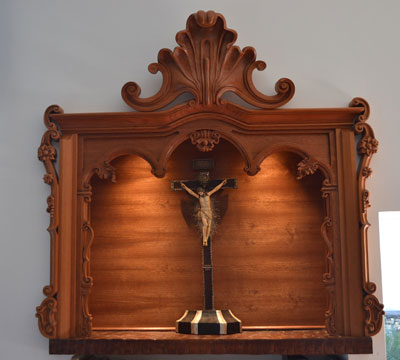
|
EDITOR'S NOTE: We featured Dilo's workshop in our
Wood News Online, January 2009 issue
.
When I opened the
July 2016 issue of the Wood News Online Magazine
, I immediately saw Mr.
Chris Bagby's smiling face just staring at me and challenging me again... He recalled me to
December 2008 when I accepted the Wood News challenge of submitting my
workshop in the January 2009 issue
. At that time the extraordinary
response to my shop led me to a global following of woodworkers, especially from the USA.
I am a 68-year old Brazilian retired executive who lives in an
apartment of a metropolis named Belo Horizonte, MG, Brazil. My amateur workshop is a 7 ft x
6 ft service closet which has physical limitations that imposed me the motto "minimum of minimum"
concerning the purchase of tools. Therefore, I replaced most of the usually mechanized
woodworking operations with the single specialty of woodcarving. Thus, I believe I have been
working exactly the same way it was done in the 18th century.
During the past 8 years I listened to many American woodworkers' opinions and I got to the
personal conclusion that the American society respects the woodworker as a professional. I also
concluded that there is a national obsession in preserving its traditional woodworking
techniques, as well as a consistent technological improvement in all American hand
tools.
Unfortunately, I have been experiencing an opposite sensation in my birth country. Brazil used
to have a magnificent artistic past in the 18th century with artworks that demonstrated the high
craftsmanship level of our ancestors', who mostly came from Portugal and Italy. However, all those
traditional techniques have completely vanished. It seems to me that the Brazilian society
tried to induce the myth that all handicrafts were fashionable only at the regrettable times of
colonial slavery. As a consequence, the local woodworker's activity is now reduced to MDF
cabinetmaking only. Very few woodworkers know how to deal with solid wood and almost
none of them know woodcarving technique. In addition, it is virtually impossibile
to buy quality hand tools at the national market. Despite this negative social environment, I
boldly decided to show my amateur woodcarver's secret face by building my own website in 2010:
www.carving-in-wood.com
.
During the following 6 years many Brazilian internet users demonstrated their appreciation to
my skill but none of them dared to hire my services because of that social prejudice. However,
only half a dozen Brazilian "nuts" overwhelmed said prejudice and commissioned me some
exquisite projects, the most recent of which I will describe below, including the
respective work-in-progress photos.
At the beginning of 2016 a well-educated art collector invited me to his home and showed
me a large room full of fine paintings and sculptures. At the center of the main wall there
was a rectangular niche where he proudly displays an antique and precious crucifix carved in
ivory and brought to Brazil by his European ancestors. Then, he challenged me to create a
wood-carved border to be applied around the niche, inspired on a rococo style shrine.

|
I first developed a full-size sketch depicting the requested shrine and observing the exact
dimensions of the niche by doing a change on the overall geometric shape, since the shrine is
vertical and the actual niche is horizontal. That draft got the client's immediate approval and I
started to draw the precise details for each one of the building sections: Pediment, Horizontal Molding, Two Inner Small Borders and Two External
Large Borders.
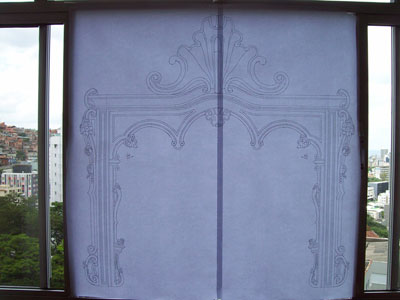
|
Once I surpassed this hard creational and technical step, I started the pleasant step of
woodcarving in my micro domestic workshop. It is necessary to say that many of my
woodworking methods are quite personal and unusual, since most of them were developed to
counterbalance the lack of appropriate tools. I mention as an example, the act of gluing a
paper photocopy of a carving detail upon the board, instead of drawing it directly by hand, in
order to avoid any transcription mistake. Another example is the act of drilling a series of
holes in a line that contours any irregularly shaped piece, in order to use the bow-saw in an
easier way. Another unusual method is to drill many depth-limited holes, in order to excavate
a flat bottomed recess. I also use to perform a sequence of different carving operations in
order to carve a molding, for example. For this particular goal, I have built a customized hand
saw inspired in the idea of a stair-saw improved with a side fence, so that I can cut a kerf
parallel to the edge with a previously determined depth. All these operations can be seen in
the photos below.
The chosen wood for this project was the Spanish cedar (Cedrela odorata) and the finishing
was done with a layer of synthetic sealer plus an artisanal wax prepared with bee's wax and
carnauba wax. The dimensions are, wide: 43", high: 41".
Now that I am idle again, I hope I have made a good use of my free time to express my sincere
feelings to the fellows somewhere.
Pediment Construction
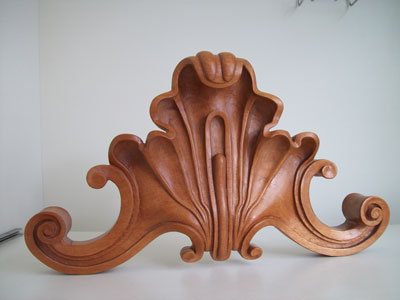
|
|
Finished Pediment
|
Horizontal Molding
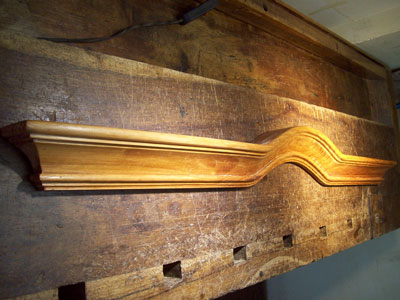
|
|
Finished Horizontal Molding
|
Two External Large Borders
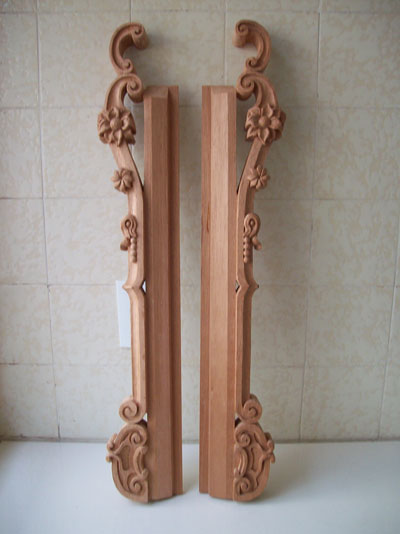
|
|
Two External Large Borders
|
Two Inner Small Borders
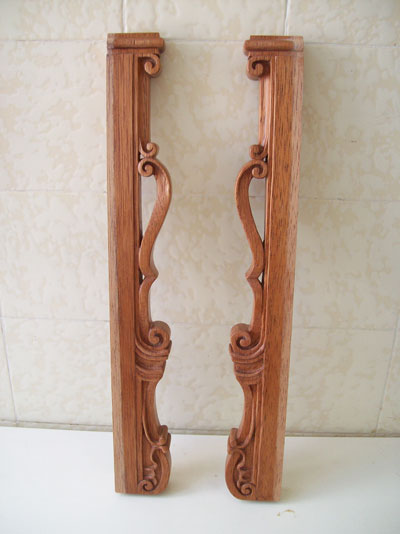
|
|
Two Inner Small Borders
|
Complete Project Assembled Together
The assembly sequence of the carved sections was the following: the inner arcade and
the two inner small borders were fixed in place by pressing them very tightly inside the
masonry inner space. The horizontal molding and the two external large borders were
glued to the wall with the help of some steel pegs. Finally, the pediment was put in place
by gluing on its back a wood block with a protrudent steel peg, since the pediment was fixed
2" above the wall. Attending my client's posterior request, I also lined the interior of the niche
with plywood.

|
|
Complete Project Assembled Together
|
Dilo can be reached directly via email at
dilofernandino@gmail.com
. You can also visit his website at
www.carving-in-wood.com
.
Return to the
Wood News Online
front page
|